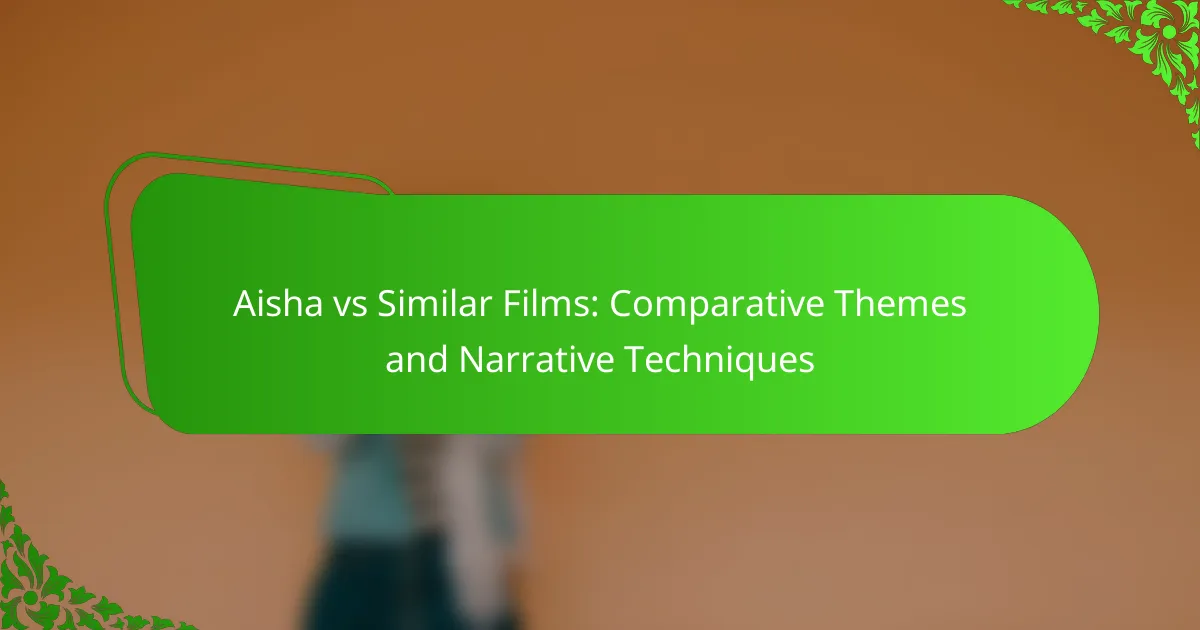Aisha captivates audiences across generations by delving into universal themes of identity, belonging, and personal growth. Its relatable characters and rich cultural references forge connections among younger and older viewers alike, creating a shared experience that resonates deeply with diverse perspectives.

How does Aisha resonate across generations?
Aisha resonates across generations by exploring timeless themes of identity, belonging, and personal growth. Its relatable characters and cultural references create a connection that appeals to both younger and older audiences, fostering a shared experience.
Universal themes of identity
The exploration of identity in Aisha is a central theme that transcends age groups. Characters grapple with questions of self-discovery, cultural heritage, and the impact of societal expectations, making their journeys relevant to anyone navigating their own identity.
This theme manifests through various character arcs, showcasing struggles that many face, such as balancing personal desires with family obligations. These universal challenges resonate deeply, allowing audiences to reflect on their own experiences.
Relatable character experiences
Aisha features characters whose experiences mirror those of the audience, enhancing its generational appeal. From first loves to career challenges, these relatable moments evoke empathy and understanding, drawing viewers into the narrative.
For instance, the protagonist’s journey through self-doubt and resilience resonates with young adults, while older viewers may connect with the themes of mentorship and legacy. This multi-generational relatability strengthens the emotional impact of the story.
Cultural references and nostalgia
Cultural references in Aisha serve as a bridge between generations, invoking nostalgia while remaining accessible to younger viewers. The incorporation of music, fashion, and social norms from different eras enriches the narrative and fosters a sense of shared history.
These references not only enhance the storytelling but also invite discussions about cultural evolution and continuity. By weaving in familiar elements, Aisha creates a tapestry that resonates with diverse audiences, allowing them to find common ground in their experiences.

What themes are explored in Aisha?
Aisha explores several significant themes, including family dynamics, social justice, and personal growth. These themes resonate deeply with audiences, reflecting both individual experiences and broader societal issues.
Family dynamics
Family dynamics in Aisha highlight the complexities of relationships within a family unit. The narrative delves into generational conflicts, showcasing how differing values and expectations can create tension. For instance, the clash between traditional family roles and modern aspirations often leads to poignant moments of understanding and reconciliation.
Characters navigate their familial ties, illustrating the impact of love, loyalty, and betrayal. This exploration encourages viewers to reflect on their own family interactions and the ways in which they shape personal identity.
Social justice
Social justice is a central theme in Aisha, addressing issues such as inequality, discrimination, and the fight for rights. The story presents characters who confront systemic barriers, making their struggles relatable to audiences facing similar challenges in their communities. Through activism and personal stories, the narrative emphasizes the importance of standing up for justice.
The portrayal of social justice issues encourages viewers to engage with real-world problems, prompting discussions about equity and the role of individuals in fostering change. This theme resonates particularly in contexts where social movements are gaining momentum.
Personal growth
Personal growth is a vital theme in Aisha, as characters embark on journeys of self-discovery and transformation. The narrative illustrates how challenges and adversities can lead to profound changes in perspective and behavior. For example, a character overcoming personal fears or societal expectations often serves as an inspiration for others.
This theme encourages audiences to reflect on their own paths and the importance of resilience. By showcasing the struggles and triumphs of its characters, Aisha highlights that growth is a continuous process shaped by experiences and choices.

Who is the target audience for Aisha?
The target audience for Aisha primarily includes young adults, middle-aged viewers, and multicultural audiences. Each group connects with the film’s themes and characters in unique ways, reflecting their diverse experiences and perspectives.
Young adults
Young adults are a key audience for Aisha, as they often resonate with the film’s exploration of identity, relationships, and personal growth. This demographic typically seeks relatable narratives that reflect their own life challenges and aspirations.
To engage this audience, Aisha incorporates contemporary issues such as social media dynamics and the quest for self-acceptance. These themes are particularly relevant to young adults navigating their formative years.
Middle-aged viewers
Middle-aged viewers connect with Aisha through its themes of nostalgia and generational conflict. This audience often appreciates stories that reflect their own life experiences, including family dynamics and the challenges of balancing personal and professional lives.
Aisha offers a nuanced portrayal of these themes, allowing middle-aged viewers to reflect on their own journeys while also considering the perspectives of younger generations. This connection can foster meaningful discussions about evolving societal values.
Multicultural audiences
Aisha appeals to multicultural audiences by showcasing diverse cultural backgrounds and experiences. The film highlights the richness of different traditions and the complexities of navigating cultural identity, making it relatable to viewers from various ethnicities.
By incorporating multilingual dialogues and culturally specific references, Aisha invites multicultural audiences to see their own stories represented on screen. This inclusivity enhances the film’s appeal and encourages broader conversations about cultural understanding and acceptance.

What are the key audience connections in Aisha?
The key audience connections in Aisha revolve around emotional engagement, relatable struggles, and shared cultural experiences. These elements resonate deeply with viewers, fostering a sense of understanding and community.
Emotional engagement
Emotional engagement in Aisha is achieved through authentic storytelling and character development. Viewers connect with the protagonist’s journey, feeling her triumphs and challenges as if they were their own. This connection is often heightened by the use of music and visual storytelling that evoke strong feelings.
For instance, scenes depicting personal loss or joy are crafted to elicit empathy, making the audience reflect on their own life experiences. This emotional resonance is crucial for maintaining viewer interest and investment in the narrative.
Relatable struggles
Aisha portrays struggles that many viewers can relate to, such as navigating family expectations and personal aspirations. These themes resonate across diverse demographics, allowing audiences to see parts of their own lives reflected in the story. The character’s dilemmas often mirror real-life challenges faced by young adults today.
Common relatable struggles include balancing career ambitions with personal relationships and dealing with societal pressures. By showcasing these conflicts, Aisha creates a bridge between the character’s experiences and the audience’s realities.
Shared cultural experiences
Shared cultural experiences play a significant role in connecting the audience to Aisha. The film incorporates cultural references, traditions, and values that resonate with specific communities, enhancing relatability. This cultural grounding helps viewers feel a sense of belonging and recognition.
For example, scenes depicting family gatherings or cultural celebrations can evoke nostalgia and pride among audience members who share similar backgrounds. Such elements not only enrich the narrative but also foster a deeper connection with the audience, making the film’s themes more impactful.

How does Aisha compare to similar works?
Aisha shares thematic elements with several notable works that explore cultural identity, generational conflict, and the immigrant experience. By examining these comparisons, readers can gain insights into the unique narrative style and character development present in Aisha.
Comparison with ‘The Joy Luck Club’
Aisha and ‘The Joy Luck Club’ both delve into the complexities of mother-daughter relationships within immigrant families. Both narratives highlight the struggles of balancing traditional values with modern aspirations, showcasing how cultural heritage influences personal identity.
While ‘The Joy Luck Club’ focuses on Chinese-American experiences, Aisha presents a broader perspective that includes various cultural backgrounds, allowing for a more diverse exploration of generational resonance. This difference enriches Aisha’s narrative, making it relatable to a wider audience.
Comparison with ‘Crazy Rich Asians’
‘Crazy Rich Asians’ and Aisha both portray the intersection of wealth and cultural identity, but they approach these themes from different angles. Aisha emphasizes the emotional and psychological aspects of cultural assimilation, while ‘Crazy Rich Asians’ often leans into the extravagance and humor of high society.
Moreover, Aisha’s focus on personal struggles and familial bonds contrasts with the more glamorous lifestyle depicted in ‘Crazy Rich Asians’, providing a deeper exploration of the immigrant experience and its challenges.
Comparison with ‘The Namesake’
However, Aisha tends to incorporate a more contemporary setting and issues, making it resonate with younger audiences. In contrast, ‘The Namesake’ often reflects on the past, creating a different narrative rhythm that emphasizes the weight of history in shaping identity.

What are the critical reception and audience reviews of Aisha?
Aisha has received a mix of critical acclaim and audience feedback, reflecting its thematic depth and cultural resonance. Critics have praised its exploration of generational issues, while audience reviews highlight its relatable storytelling and character development.
Positive critical acclaim
Critics have lauded Aisha for its nuanced portrayal of complex family dynamics and the struggles of modern identity. The film’s cinematography and direction have also been highlighted, with many reviews noting its artistic merit and engaging narrative style.
Several film festivals have recognized Aisha, awarding it accolades that underscore its impact on contemporary cinema. Review aggregators indicate that a significant percentage of critics recommend the film, emphasizing its relevance in today’s cultural landscape.
Audience ratings and feedback
Audience ratings for Aisha have generally been favorable, with many viewers appreciating its relatable themes and character arcs. On platforms like Rotten Tomatoes and IMDb, the film has garnered solid ratings, often reflecting a consensus of positive viewer experiences.
Feedback from audiences often highlights the emotional depth of the characters and the authenticity of their struggles. Many viewers express a connection to the generational themes presented, making it a topic of discussion among diverse demographics.
Impact on cultural discussions
Aisha has sparked important conversations about generational differences and cultural identity, resonating with audiences across various backgrounds. The film’s themes encourage discussions about the challenges faced by younger generations in navigating familial expectations and societal norms.
Social media platforms have seen an uptick in discussions surrounding Aisha, with many users sharing personal stories that relate to the film’s narrative. This engagement reflects the film’s ability to resonate deeply with viewers, fostering a sense of community and shared experience.










